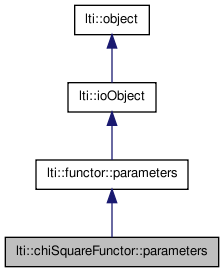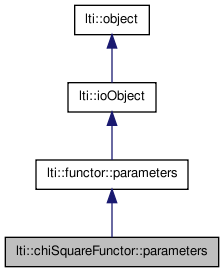

|
latest version v1.9 - last update 10 Apr 2010 |
|
the parameters for the class chiSquareFunctor More...
#include <ltiChiSquareFunctor.h>


Public Member Functions | |
| parameters () | |
| parameters (const parameters &other) | |
| ~parameters () | |
| const char * | getTypeName () const |
| parameters & | copy (const parameters &other) |
| parameters & | operator= (const parameters &other) |
| virtual functor::parameters * | clone () const |
| virtual bool | write (ioHandler &handler, const bool complete=true) const |
| virtual bool | read (ioHandler &handler, const bool complete=true) |
Public Attributes | |
| double | accuracy |
| bool | discrete |
| bool | equidistant |
| int | maxNumOfIntervalls |
| int | maxSteps |
| double | mean |
| double | minimalWidth |
| std::string | nameOfInfoFile |
| bool | saveInfoFile |
| bool | useBetterMeanAndVar |
| double | variance |
the parameters for the class chiSquareFunctor
| lti::chiSquareFunctor::parameters::parameters | ( | ) |
default constructor
Reimplemented from lti::functor::parameters.
| lti::chiSquareFunctor::parameters::parameters | ( | const parameters & | other | ) |
copy constructor
| other | the parameters object to be copied |
| lti::chiSquareFunctor::parameters::~parameters | ( | ) | [virtual] |
destructor
Reimplemented from lti::functor::parameters.
| virtual functor::parameters* lti::chiSquareFunctor::parameters::clone | ( | ) | const [virtual] |
returns a pointer to a clone of the parameters
Implements lti::functor::parameters.
| parameters& lti::chiSquareFunctor::parameters::copy | ( | const parameters & | other | ) |
copy the contents of a parameters object
| other | the parameters object to be copied |
| const char* lti::chiSquareFunctor::parameters::getTypeName | ( | ) | const [virtual] |
returns name of this type
Reimplemented from lti::functor::parameters.
| parameters& lti::chiSquareFunctor::parameters::operator= | ( | const parameters & | other | ) |
copy the contents of a parameters object
| other | the parameters object to be copied |
| virtual bool lti::chiSquareFunctor::parameters::read | ( | ioHandler & | handler, | |
| const bool | complete = true | |||
| ) | [virtual] |
read the parameters from the given ioHandler
| handler | the ioHandler to be used | |
| complete | if true (the default) the enclosing begin/end will be also written, otherwise only the data block will be written. |
Reimplemented from lti::functor::parameters.
| virtual bool lti::chiSquareFunctor::parameters::write | ( | ioHandler & | handler, | |
| const bool | complete = true | |||
| ) | const [virtual] |
write the parameters in the given ioHandler
| handler | the ioHandler to be used | |
| complete | if true (the default) the enclosing begin/end will be also written, otherwise only the data block will be written. |
Reimplemented from lti::functor::parameters.
the accuracy for the integration of the gauss function.
small values lead to a good approximation
default is 1.0e-5, reasonable values are 1.0e-10...infinite if the user sets a value smaller than 1.0e-10, accuracy is set to 1.0e-10 small values cause very long calculations
must allways be "true" if you have discrete data, otherwise the Chi-Square Test won't work properly.
default is true, because it does no harm except that it constrains the intervall size to be multiple of minimum data distance
true means that all intervalls will have the same size
equidistant is not good for data with small and large distances between the elements, because there may be intervalls which contain no elements
default is false
data is splitted in maxNumofIntervalls, than the number of intervalls is reduced untill constraints are met
maxNumberOfIntervalls must not be smaller than 3 default is 100;
the maximum number of steps for the integration; integration is stopped after maxSteps even if accuracy is not reached
default is 10, reasonable values are 5...15
if the user sets a value smaller than 5, maxSteps is set to 5 if the user sets a vlaue larger than 15, maxSteps is set to 15
be careful with large values, because it may take very long time as long as accuracy is not reached, the integration intervall is devided into more and more intervalls up to 2^maxSteps intevalls
the user may give the estimated mean of the data
if no value is specified, mean of data is calculated by lti::SerialStatsFunctor and this value is used for the calculation of the chiSquare test
default is numeric_limit<double>
the minimal width of an intervall
if the parameter minimalWidth is not explicitly set (i.e. left at default value < 0), minimalWidth is set to the smallest distance of the given data
file contains information about the parameters, status and errors default name: chiSquareInfo.txt
should the infoFile be saved? default is true
if useBetterMeanAndVar is true mean and variance are calculated again after the intervalls were set if all constraints are still met, this values will be used if not an error is reported and the old values will be used
default is true;
the user may give the estimated variance of the data
variance must be positive, if negative value is given absolute of this value is used
if no value is specified, variance of data is calculated by lti::SerialStatsFunctor and this value is used for the calculation of the chiSquare test
default is numeric_limit<double>